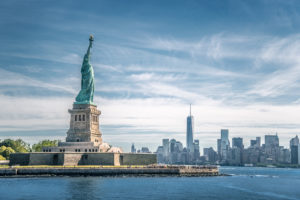
OMB releases its annual report on the benefits and costs of regulations, the Supreme Court decides not to hear a case on the Trump Administration’s authority to rescind DACA, and more…
IN THE NEWS
- The Office of Management and Budget released its annual report on the benefits and costs of federal regulations. The report examined major regulatory activity in fiscal year 2016 and indicated that the estimated annual costs of significant rules issued in 2016 were estimated to deliver $17.8 to $35.8 billion in annual benefits with an estimated annual cost of $4.3 to $6.4 billion.” According to the report, “the rules with the highest estimated benefits as well as the highest estimated costs come from the U.S. Environmental Protection Agency.”
- The U.S. Supreme Court decided not to hear a case brought by the U.S. Department of Homeland Security about the Trump Administration’s authority to rescind the Deferred Action for Childhood Arrivals (DACA) policy. The U.S. District Court for the Northern District of California had blocked DHS from rescinding the policy, keeping DACA in place. DHS had then appealed directly to the Supreme Court—bypassing the intermediate appellate court. Given the Supreme Court’s refusal to hear the matter at this time, though, the case will go forward for appeal before the U.S. Court of Appeals for the Ninth Circuit.
- A judge for the U.S. District Court for the District of Columbia dismissed a lawsuit that challenged President Donald Trump’s one-in, two-out Executive Order. The judge ruled that the plaintiffs—Public Citizen, the Natural Resources Defense Council, and AFL-CIO—were not the proper parties to bring the case because they failed to show that their members would be harmed by the Order.
- In an effort to improve air quality in urban areas, Germany’s supreme administrative court ruled that German cities can ban diesel cars from some city streets. Environmental Action Germany (DUH), an environmental and consumer watchdog in Germany, initially sued the cities of Stuttgart and Dusseldorf claiming the “air pollution massively exceeds allowable levels” and that the cities “hadn’t done enough to combat emissions.” DUH reportedly called the decision a “great day for clean air in Germany.” Upset with the decision, Hans Peter Willseifer, president of a major German labor association, reportedly stated that “carmakers are to blame for the diesel problem, not us tradesmen.”
- The U.S. Court of Appeals for the Ninth Circuit ruled that the Federal Trade Commission (FTC) has the authority to regulate Internet Service Providers. When the Federal Communications Commission (FCC) repealed its net neutrality regulations last December, it left regulation up to the FTC. In response to the ruling, FCC Chairman Ajit Pai said that the FCC “looks forward to working closely with the FTC to ensure the protection of a free and open Internet.”
- The U.S. District Court for the Southern District of California upheld the U.S. Department of Homeland Security’s waiver of certain environmental laws in preparation for the Trump Administration’s proposed border wall. In response to the court’s decision, California Attorney General Xavier Becerra—whose state was among the plaintiffs that brought the case against the Trump Administration—said that the “Administration is ignoring laws it doesn’t like” and that the wall “simply does not belong in the 21st century.” But a representative of the U.S. Department of Justice approved of the decision, saying that DHS has the legal power “to construct a border wall without delay.”
- U.S. Attorney General Jeff Sessions announced the Department of Justice’s creation of the Prescription Interdiction & Litigation (PIL) Task Force. The PIL Task Force aims to combat the prescription opioid crisis by holding drug manufacturers, pharmacies, and doctors accountable for unlawful actions. Sessions explained that “this new task force will make the Justice Department more effective in saving Americans from the scourge of opioid addiction.”
- Lawmakers in Arizona and Georgia have introduced bills that would allow payments to the government be made using cryptocurrency, such as Bitcoin. The Arizona bill would allow cryptocurrency to be used to pay for taxes “and any interest and penalties” to the Arizona Department of Revenue. The Georgia bill would allow payments for “taxes and license fees” to be made using cryptocurrency.
- The California Department of Motor Vehicles (DMV) announced that the California Office of Administrative Law has approved regulations on driverless car testing and use. The regulations bring California closer to letting the general public use driverless cars on public roads. Jean Shiomoto, director of the California DMV, called the approval “a major step forward” and maintained that the DMV would continue to account for safety in driverless cars.
WHAT WE’RE READING THIS WEEK
- In a paper for the Arizona Journal of International and Comparative Law, Belinda Reeve and Roger Magnusson, professors at the University of Sydney Law School, analyzed food marketing regulations in six different countries, assessing these regulations’ effectiveness, transparency, and accountability. Reeve and Magnusson asserted that no country is “entirely successful in protecting children from exposure to marketing of unhealthy food” but explained that there are ways to “strengthen” regulatory schemes.
- The Associated Press released an article discussing the Trump Administration’s treatment of transportation safety regulations. According to the article, the U.S. Department of Transportation “has withdrawn, repealed, delayed or put on the back burner at least a dozen significant safety rules.” The article examined regulations that apply to the automobile, trucking, pipeline, aviation, and rail industries.
- In a paper, David Hyman of Georgetown University Law Center and William Kovaciac of George Washington University Law School argued that privacy policy in the United States is spread over a “hodgepodge” of agencies and considered which agencies should create and implement privacy policy. Hyman and Kovaciac suggested that either the FTC or a newly created agency should be the primary regulator charged with protecting privacy rights.



